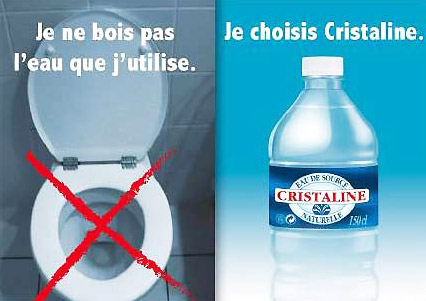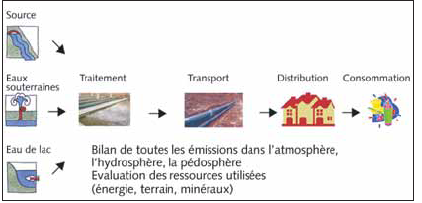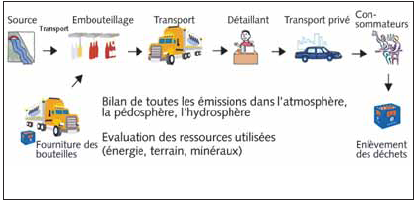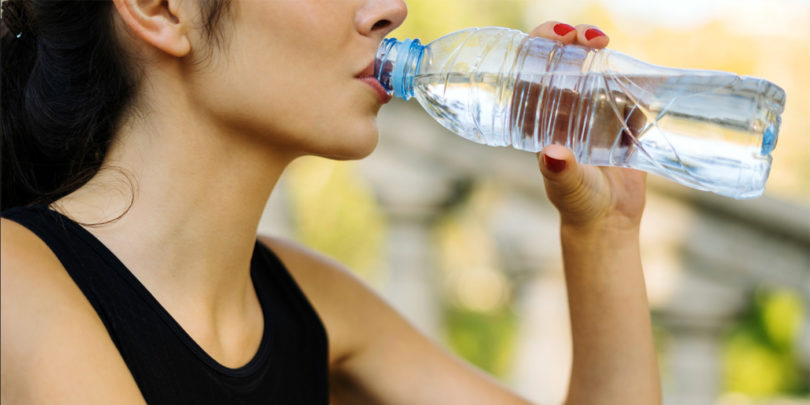Updated article : 26/01/2019
According to nutritionist Hélène Baribeau to stay healthy to drink between 1,5 and 2 L of water per day. It remains to know what water preferred, that of the tap or that of the bottles ?
According to Chambre Syndicale mineral waters, a French person consumes every year 125 L of bottled water (against less than 40 L in 1970). In 2016 this represented a consumption of 8,3 billion liters for the entire French population.
In 2006, the brand CRYSTAL launched the slogan “ Anyone who claims that tap water always tastes good should not drink it often ! » or « I do not drink the water I use » (see advert below) that caused a real controversy. The brand attracted a lot of criticism and was notably accused of wanting to scare consumers about the quality of tap water, which is one of the most monitored foodstuffs in France.. The tap water is also sometimes even more monitored than some bottled water.

We see here the main limits of consumption of bottled water that are the cost, the environmental impact and finally, We ask the question of whether bottled water is actually better for health.
The cost
The cost compared with the tap water is much higher. We believe that drink bottled water costs between 200 and 300 times more expensive than to drink water from the tap (This calculation is approximate because the price of water supply and the price of bottled water can greatly vary depending, respectively, of the region and the brand). We see immediately that the price differential is enormous and that consume bottled water is a luxury !
The environmental impact
According to the Swiss study “ Ecobilan drinking water - mineral water " produced by ESU-Services (expert office in life cycle analysis), the tap water is 1000 greener times only mineral water (bottled or cylinder) !
A diagram is worth a thousand words :

Source : From the source to the glass, the life cycle of drinking water

Source : From the source to the glass, the life cycle of drinking water.
A huge amount of energy and waste
In 2014, the France has produced 12 billion liters of bottled water more than double what had happened twenty years ago. In 2016 in the world, they are not less 480 billion plastic bottles which were produced (more than 15 000 bottles per second !).
This production is done with oil, a non-renewable energy. Huge amounts of oil used in the manufacture of plastic bottles, raw material that must be imported to the bottling plant, who will also consume energy for the manufacture of containers. Once conditioned, Water is routed over many kilometers by rail, ship or truck. A water bottle travels an average 300 km, bottling recycling.
It is completely absurd from an ecological point of view to find bottles Perrier or’Evian in Los Angeles in the US, for example, While the water flows from taps !

A very low life expectancy
A bottle of water, once in the hands of consumers, has an extremely low life expectancy ! Indeed, the content is quickly drunk and the bottle ends up in 44 % cases in the trash with household waste According to Eco-Packaging.
A very long degradation
A plastic bottle is not or is only marginally degradable naturally. It is estimated thata bottle puts between 100 and 1000 years to degrade in nature ! [6].
Unfortunately bottles still often end up in landfills. (in developing countries) and are thus buried underground in the best of cases or finish in the oceans. Cylinders degrade more quickly in the sea (with the salinity of water and solar radiation). These small fragments are swallowed by birds, fish, etc. contaminating the entire food chain and further causing slicks of viscous plastics. « Concern grows over the mountains of plastic accumulating in the environment. To the point that today there is a veritable ocean of plastic » [1].
After seeing only consume bottled water is both bad for the environment and for its portfolio, is it still benefits to drinking bottled water ?
Health impacts
Various plastics :

PETE or PET : Polyethylene Terephthalate
Mineral water bottles, soft drinks, fruit juices…
 HDPE : High density polyethylene (HDPE)
HDPE : High density polyethylene (HDPE)
Milk bottles, bottle stoppers…
 PVC or V : Polyvinyl chloride
PVC or V : Polyvinyl chloride
Bottles of mineral water, wine, vinegar, boxes food, food movies, vials, solvents…
![]() LDPE : Polyethylene low density
LDPE : Polyethylene low density
Food movies, trays, vials, freezer bag…
 PP : Polypropylene
PP : Polypropylene
Yoghurt pots, baby bottles, trays of butter and margarine…

PS : Polystyrene
Yoghurt pots, cutlery, plates and glasses plastic…

OTHER (Other) : Polycarbonate generally
Baby bottles, rigid plastic cups, food containers, plastic bottles (milk, ketchup, water, etc.)…
The problem of plastic incompletely
Categories 3, 6 and 7 are to be avoided !
3) PVC is considered hazardous to health and the environment. It contains lead, cadmium, of phthalates and DEHA.
Bis adipate (2-ethylhexyl), also known as DEHA, is a chemical that may cause cancer (study on laboratory animals), to have negative impacts on the liver, the kidneys, the spleen and bone formation [4] [5].
6) Polystyrene containing styrene is considered to be toxic to the brain and nervous system. It has adverse effects on the liver, the kidneys, the stomach and red blood cells.[2]
7) Plastics in this category may contain Bisphenol A (BPA), a disruptor. BPA migrates plastic to liquid in larger proportions when the liquid is hot and/or fatty.
We see that all plastics are not safe and must be wary when buying not only bottled water but also other foods packed with plastic. It is important to know what type of plastic affects your drink or food. In general, you will find these bottles on the background codes, containers, plugs, etc.
Plastic bottled water contains two times more hormones than tap water
According to a study by two German researchers, published in the journal Environmental Science and Pollution Research, the plastic release into the water of hormones (males or females) that we call endocrine disruptors. These hormones are likely to disrupt the reproductive functions of the man, even at very low doses. The study is made on 20 packaging of mineral waters in Germany that contain all of the PET (Polyethylene Terephthalate) and water in containers in glass in order to make a comparison. “In twelve of them, the researchers noted in the water from plastic bottles twice higher hormonal activity” [3]. This revelation immediately boosted industrial plastic which specify that the study does not conclude a health risk.
Conclusion
Even if the tap water is very uneven from one territory to another (water is in large urban areas controlled significantly more than in rural areas which further also a more water contaminated by agriculture), We see that consume bottled water night portfolio, to the environment, and “pourrait” harmful to health.
To know the quality of water from the tap in his region : Result of sanitary control of water quality
Furthermore, some alternatives exist :
- The filter jug (read the article : Filter jugs : a health hazard ?)
- The water softener (Article coming soon)
- The gravity filter (full test coming soon)
However, if you continue to drink bottled water, we recommend that you regularly change mark. Indeed, some of these waters contain a lot of minerals which can, in overdose, cause health problems. The waters as Volvic, Perrier and Evian, for example, have lower mineral content and better suited for daily consumption.
Similar articles :
- Initial analyses on the traces of drugs in water
- Filter jugs : a health hazard ?
- Our water is polluted and toxic
- Dangers and risks of Bisphenol A (BPA)
Main references :
[1]. Science and life – Plastic is fantastic
[2]. Smart Plastic Guide – Institute for agriculture and trade policy
[3]. The Figaro – Should we ban water in plastic bottles ?
[4]. The Government of Canada chemical substances Web site (www.chemicalsubstanceschimiques.GC.ca)
[5]. Technical Fact Sheet on Di (2-ethylhexyl) adipate.
[6]. Consoglobe.com
The quality of water packaged in France
SDWF (Safe Drinking Water Foundation in the Canada)
HANDLES (National Safety Agency)
Chambre Syndicale mineral waters
"LCA water - mineral water" conducted by ESU-Services (expert office in life cycle analysis)
From the source to the glass, the life cycle of drinking water
Technical specifications – The plastic bottle and plastic bottles (CEREMAP : Center for studies on recycling of plastics).


Hello,
So the comparison is complete, It should also consider that the pipes leave in the tap water and especially, especially, on the comparison between the quality of mineral water / tap water, because it is the possible impact on the health individual, his children, well before the impact on the environment and even the wallet, who will be taken into account by a person reading your article.
( = A person who wondered about the silent poisoning of his power, or a person who is already victim and sick.)
Thank you for your constructive comment. We share the idea that should be specifically compare the quality of the water bottle and tap. However some difficulty arises : -The quality of the tap water varies very strongly from one region to another (a link to the Government site is still displayed in the article to know the quality of the water of its common). -There are a large number of mineral waters in France who do not always have the same type of container (various plastics, therefore different possible incompletely). The study would be daunting but very useful for health.… Read more "
the plastic taste is recurring in different brands, Does this mean an infection ?
IF your water has a plastic taste, is that your taste detection threshold is exceeded. So you drink (also) plastic.
empty plastic bottle was half a, Water vittel, closed, and put out a daylight, buvée the five days later, she feels the alkali is a poison
dangerous, never put a bottle of mineral water in the sun is also a dangerous poison
Hello,
I find you still well clement about the tap water, known that treatment lets certain harmful substances when it adds no news.
Although analyses are “good”, is that what we seek… And some administrative standards (who would sometimes need to be reviewed) is not necessarily a guarantee of quality.
Hello, Indeed, We are in agreement with you, the tap water is not perfect (drug residues, and a range of other substances, see article “Our water is polluted and toxic”). This article is intended to show that bottled water is not either. She also suffers, to a lesser extent, of various contaminations. For bottled water the economic and ecological problem is also. For the moment there is not, to our knowledge, a water “perfect” or which would bring closer. Public authorities have indeed to make great efforts to improve the… Read more "
Here are a few truths in relation to bottled water that does good knowledge….. but, as pointed out by some other comments, the author of the article only speaks of the dangers of bottled water but “forget” to mention that : – water from the tap, If it is supervised in France is only for certain pollutants (nitrates essentially, whose most common display level on the back of their invoice)… but alas for the consumer, It also contains drug residues (chemotherapy and other antibiotics absorbed by patients and naturally rejected by urine and feces), very… Read more "
Your remark is relevant and target the problem we have in France, We do not have at our disposal a water “perfect”, without risk. This article focuses primarily on bottled water and occasionally compares with one tap. Furthermore, My leniency with water from the tap is all relative (see the article “Our water is polluted and toxic“). It is time that the public authorities take action (regulating the use of pesticides and other, antibiotics for livestock, filtration of traces of drugs in water etc., etc.) to ensure that… Read more "
The link concerning the result of sanitary control of the quality of the water is useful provided that annual history of the analyses because at the monthly level analyses are much more succinct and may indicate a comply with bacteriological and physico-chemical water if all problematic elements are not tested. In my case, There is an excess of arsenic and fluorine that cannot be solved only by a filtration reverse osmosis… so impossible for me to use a simple filter jug and I have choice to use water in a bottle for my consumption… Read more "
There are a lot of poisoning which is easily understood by explaining the movement of air that enters the bottle when drunk to even this, accompanied by eating that is still in our mouths which by the movement of air is entering the bottle of this eating. So if the bottle is closed and later completed, the time spent until the next SIP of water of this same bottle, Depending on the ambient temperature, will give more or less the chance for food to decompose in the bottle and then make way for the bacteria that we will ingest during… Read more "
bottled water can be dangerous because imaginon than water and badly treat, bacteria and viruses can be present in water so yes I think it is dangerous
January 16 2013
Expert Allo in drinkable water.
I drink DISTILLED water, It seems that our body
does not need the cell contained in the water.
Gold, just like our cat, are we correct ?
Bye, Let's be happy, life is clear as water.
Simon
The supply lines to tap its PVC tee …. non ?
So the tap water stayed inside for a long time … exact ?
and not, There are not PVC ,only the evacuation of waste water pipes are made of pvc.
readers it is very important to push your personal research on the water out of the faucet,the article did not care to mention the detrimental of the water side, keep vousi to drink water from the tap,the Nazis used the tap water to do what? It has this nice question to look for have a good answer and you'll be convinced.
If you have enough money to wage war to industrial detractors villains such as producers of world pesticides select one of three sus waters cited. The indusrties in this area do not gift and do not play.
Drink water in glass bottles to be the most environmentally friendly and stay healthy. The tap water is not always what it should according to regions (the right to drinking water of good quality has been destroyed by our beautiful chemical and pharmaceutical industry) This gives obviously more work in the hospital world that will make the inocent because this is their best account of sustainable. Aluminum sulfide,metal heavy etc…,long Therm will cause illness of any type; cancers,alzeimer,Parkinson,Autism etc.…. Pvc is a silent and unscrupulous killer!(so avoid bottles as much as possible… Read more "
I drink the spring water that I put in glass bottles… with screw cap… aluminium. When I screw and unscrew those caps, lose many molecules of aluminum? When I sleep my bottles in the fridge, can a transfer of these molecules happen? Thanks in advance for any info on this subject!
Hello,
I have the same question. I like you but wonder about that famous aluminum cap… Have you found answers?
The cork, the leather, wood (Oak, bamboo, elderberry, fruit, beech (heat treated), the rubber (natural) are good products to perform the tightness of your containers, conserve, seau etc..
Glass, the gourd (Lagenaria siceraria), terracotta, certain ceramics and enamels, wood often used to make the quality of container, think about it.
Limit the amount of plastic in the seal by mixing different materials (lid and glass container with a rubber seal e.g.).
Avoid soft plastics which generally contain more of bisphenol A with other.
Avoid glaring colors.
Blessed are the poor of spirit…